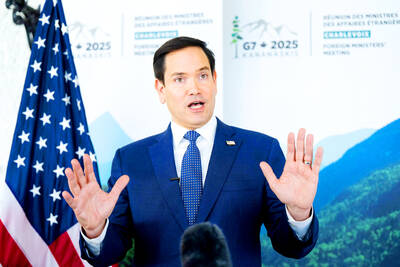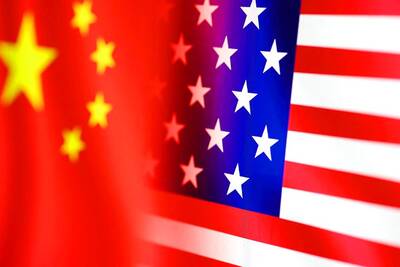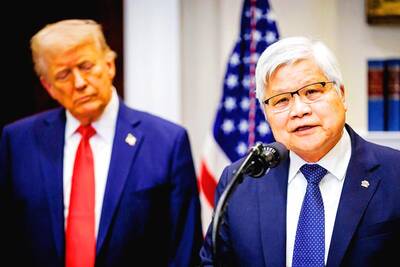President Chen Shui-bian (
"As the US and Taiwan have the Taiwan Relations Act, Taiwan and Japan must have a better cooperative relationship," Chen said. "We'd like to see a strategic dialogue mechanism set up between the two countries, something like Japan-Taiwan security talks," he said.
A Japanese version of the TRA could serve as a pivotal foundation for maintaining peace and stability in the Asia-Pacific region, he said.
Chen made the remarks yesterday morning during a video conference exchange with Japanese lawmakers, academics and reporters organized by Japan's Waseda University.
The president proposed that the US, Japan and Taiwan hold trilateral dialogues before talking to China.
He thanked Japan and US for affirming that the protection of Taiwan is a "common strategic objective" and encouraging both sides of the Taiwan Strait to resolve their differences through peaceful dialogue.
"I hope that Japan will play the role of a facilitator and balancing force between Taiwan and China," he said.
Chen said the North Korea crisis involves not only the test firing of missiles in July and and underground nuclear test last month but the fact that the North is not a democratic country and that its government lacks transparency.
The lack of oversight -- by a legislature, opposition parties and the public -- of its national leader also poses a serious problem, Chen said.
Although Taiwan is not a UN member, Chen said that his administration would back the implementation of the UN sanctions against Pyongyang.
While rumor has it that Japan might sacrifice Taiwan to work with China in a bid to resolve the North Korean crisis, Chen said that Taiwan and North Korea are two separate issues and cannot be mixed together.
Chen said that Washington has said that it would not sacrifice Taiwan's interests in exchange for China's cooperation on Pyongyang, and that he believes the Japanese government, its Diet and its people would not sacrifice Taiwan's interests either.
Chen said the improvement of Japan-China relations -- as shown by Japanese Prime Minister Shinzo Abe's recent visit to China -- would not affect Taiwan's interests but corresponds with the common interests of Taiwan and Japan.
In addition to closely monitoring China's power struggles, the government also pays attention to its democratic wakening, Chen said.
"We do not want to see the rise of China as the rise of hegemony or military force," he said. "As long as China becomes a democratic country and connects itself with the world, we are not worried about its political infighting."
Describing the Taiwan-Japan relations as being in the optimum phase since the severance of diplomatic ties 34 years ago, Chen said he hoped the two countries could sign a free trade agreement.
Chen asked whether it might be feasible to ink an economic partnership agreement before as the first step toward a free trade pact.
also see story:

‘CROWN JEWEL’: Washington ‘can delay and deter’ Chinese President Xi Jinping’s plans for Taiwan, but it is ‘a very delicate situation there,’ the secretary of state said US President Donald Trump is opposed to any change to Taiwan’s “status quo” by force or extortion and would maintain that policy, US Secretary of State Marco Rubio told the Hugh Hewitt Show host on Wednesday. The US’ policy is to maintain Taiwan’s “status quo” and to oppose any changes in the situation by force or extortion, Rubio said. Hewitt asked Rubio about the significance of Trump earlier this month speaking with Taiwan Semiconductor Manufacturing Co (台積電) chairman C.C. Wei (魏哲家) at the White House, a meeting that Hewitt described as a “big deal.” Asked whether the meeting was an indication of the

‘RELATIVELY STRONG LANGUAGE’: An expert said the state department has not softened its language on China and was ‘probably a little more Taiwan supportive’ China’s latest drills near Taiwan on Monday were “brazen and irresponsible threats,” a US Department of State spokesperson said on Tuesday, while reiterating Washington’s decades-long support of Taipei. “China cannot credibly claim to be a ‘force for stability in a turbulent world’ while issuing brazen and irresponsible threats toward Taiwan,” the unnamed spokesperson said in an e-mailed response to media queries. Washington’s enduring commitment to Taiwan will continue as it has for 45 years and the US “will continue to support Taiwan in the face of China’s military, economic, informational and diplomatic pressure campaign,” the e-mail said. “Alongside our international partners, we firmly

KAOHSIUNG CEREMONY: The contract chipmaker is planning to build 5 fabs in the southern city to gradually expand its 2-nanometer chip capacity Taiwan Semiconductor Manufacturing Co (TSMC, 台積電), the world’s biggest contract chipmaker, yesterday confirmed that it plans to hold a ceremony on March 31 to unveil a capacity expansion plan for its most advanced 2-nanometer chips in Kaohsiung, demonstrating its commitment to further investment at home. The ceremony is to be hosted by TSMC cochief operating officer Y.P. Chyn (秦永沛). It did not disclose whether Premier Cho Jung-tai (卓榮泰) and high-ranking government officials would attend the ceremony. More details are to be released next week, it said. The chipmaker’s latest move came after its announcement earlier this month of an additional US$100 billion

Authorities yesterday elaborated on the rules governing Employment Gold Cards after a US cardholder was barred from entering Taiwan for six years after working without a permit during a 2023 visit. American YouTuber LeLe Farley was barred after already being approved for an Employment Gold Card, he said in a video published on his channel on Saturday. Farley, who has more than 420,000 subscribers on his YouTube channel, was approved for his Gold Card last month, but was told at a check-in counter at the Los Angeles International Airport that he could not enter Taiwan. That was because he previously participated in two